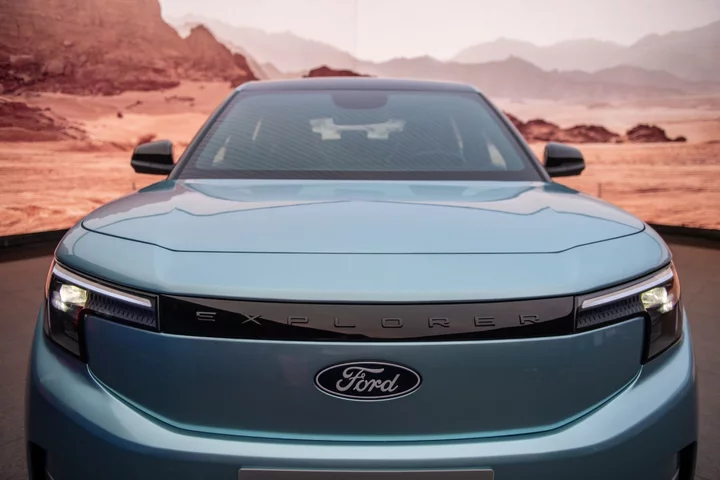When Ford Motor Co.’s UK boss visited the automaker’s massive production complex in Turkey last week, temperatures reached as high as 41C (106F). Back home, one topic was dominating the headlines: whether Prime Minister Rishi Sunak ought to relax his government’s green goals.
The dissonance was worrisome to Tim Slatter, a 25-year Ford veteran.
“We’re in danger of making it feel like the world’s on fire; it’s too late,” Slatter said in an interview. “That’s not the case. If we want to make this happen, we can make this happen. We can reduce CO2 emissions, and we can probably get them down in time. But we need to get on with it.”
Ford’s call to carry on contrasts with a growing inclination on the part of the UK’s Conservative Party to compromise on energy policy and the environment for political gain. Among the measures Sunak is feeling the most pressure to walk back is Boris Johnson’s vow to end the sale of cars powered entirely by petrol and diesel from 2030 onward.
Johnson boasted in November 2020 that he’d positioned the UK to be the fastest G7 country to decarbonize cars. For the time being, at least, it’s now on roughly the same track as the European Union.
The Tories aren’t nearly as enthusiastic about the 2030 policy as they were three years ago. Their shift has to do with last month’s unexpected by-election victory in northwest London. The party hung onto Johnson’s old parliamentary seat by effectively turning the vote into an unofficial referendum on Labour Mayor Sadiq Khan’s plan to expand the Ultra Low Emission Zone, or ULEZ, which requires owners of older cars to pay extra to drive their polluting vehicles.
UK Cabinet Minister Michael Gove suggested last month that being more flexible about green pledges will bolster the Tories’ chances against Labour in the next general election.
“If people think that you are treating the cause of the environment as a religious crusade, in which you’re dividing the world into goodies and baddies, then you alienate the support that you need for thoughtful environmentalism,” Gove said in an interview with the Telegraph.
While Sunak has so far resisted explicit calls to roll back the 2030 policy, he’s walking a fine line, telling the same newspaper last week that he’s on drivers’ side.
Slatter, who’s transitioning out of his job as Ford UK chair in the coming weeks to take on a global role, doesn’t want or expect to see a rollback of the 2030 policy. It wouldn’t be in the automaker’s interest, as it’s committed to having an all-electric lineup of passenger cars for Europe by the end of the decade.
Wobbling by the government would risk sending the wrong signal to the companies and investors Ford is counting on to build enough charging infrastructure to support the shift to EVs.
What Ford and the broader UK car industry could use more so than a debate over rules for 2030 is more initiative around nearer-term policies. The auto industry is still waiting for the Department for Transport to finalize its zero-emission vehicle, or ZEV, mandate that’s scheduled to take effect on Jan. 1.
The proposed minimum ZEV target for each manufacturer’s sales next year of 22% would be a stretch for most companies, considering roughly 16% of new cars sold in the first half of the year were battery-electric. That industrywide share includes sales by Tesla Inc., which only sells EVs.
Slatter is concerned that the mandate won’t recognize the latest industry forecasts suggesting that EV adoption will slow due to the toll that rising living costs are taking on consumers. Also up in the air is whether carmakers can avoid 10% tariffs on EU-built EVs entering the UK market because of Brexit-deal rules requiring battery materials to be sourced locally.
Without more refinement and clarity of the ZEV mandate, Ford’s plan to bring nine EVs to the market by 2025 “will be met with more difficulty,” Slatter said, adding that the EU trade rules “pose a threat to our business and investment plans.”

